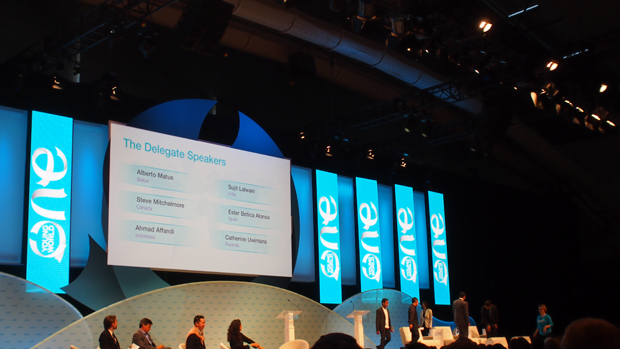One Young World Ambassador Alanda Kariza reports on the Education Plenary.
The session began with Kate and David showing the results of the Global Millenials Study 2012, in which, apparently most young people believe that poverty and corruption are the biggest barriers to have a universal access to education. The counsellors invited to the stage were Fatima Bhutto (writer & activist), James Chau (media personality), Pete Cashmore (Mashable), as well as Elio Leoni-Sceti (LSG Holdings).
There were many important points brought up by the Delegate Speakers. Alberto Matus from Belize spoke about the fact that literacy is an integral part in addressing global challenges, and that it is crucially important to integrate technology to the curriculum. Building access to education requires strategic planning and a great collaboration among people, to make it work. Steve Mitchelmore from Canada, spoke about the Pathway to Education program that enforces a contract between students, parents, and teachers to have a shared responsibility in education. The program provides support to help people combat illiteracy, through academic, mentoring, financial, and social support. Mitchelmore mentioned that for every dollar invested, there is a return of $25 in the form of higher employment rate and other measures. We need a network that provides support to unlock the potential of youth. For ore information about the Pathway to Education program click here
Moreover, Sujit Lalwani from India made an important statement that education is a birth right of every people. In December, he is going to organize a program (which hopefully will go global, therefore he needs YOUR involvement!) to combat illiteracy. In India, 33% people are illiterate; and 85% people are computer illiterate. It's not great to born a human being, it's great to die a human doing. Catherine Uwimana from Rwanda reminded us that change always begins with education, and that education is our ultimate chance to get out of poverty. "We are here because dreams brought us here," said Catherine. Ester Alonso spoke mainly about computer illiteracy, becauseusing a computer means having a connection to the world.
Last but not least, there was Ahmad Affandi from Indonesia. He shared of how it's difficult for the government to distribute education evenly. He established a foundation called Spectrum to provide education for everyone, and he teaches deaf-mute students. He also made an important point that many religious schools that teach a religion exclusively might harm the unity of a nation. Religious schools also need pluralism in the curriculum. He said, "Everyone, including those with different ability, has the right to education."
Others made important points related to education, including about indigenous language, gender equality, sex education, the importance of media's role, etc. I stepped up to the mic but there was not enough time so I did not get to express my point across. However, to end this report, I'd like to give a reminder to all OYW Delegates and Ambassadors:
I'm aware of the fact that the cost of attending OYW might "only" be one-tenth of the cost to go to an Ivy league school in the United States; but in a country like Indonesia, we could send more than 250 children to primary school for one year. As much as it's inspiring and some of us might even use it to brag among our friends, the point of OYW is not only about meeting Bill Clinton, Muhammad Yunus, or other high profile leaders. The real point is to make sure that the $5,000 invested in us is at least as impactful as sending 250 kids to school. This is a reminder for me, for you, and for us to make sure that we replicate the opportunity, spread our experience and knowledge to hundreds, thousands of others in our own communities. But no, 250 people is not enough. Create an impact for at least 1000 people, for each of us. That is the very least. Nevertheless, I am sure we can do this, and we would be able to fulfill our pledge to combat illiteracy in our own communities.
Image

